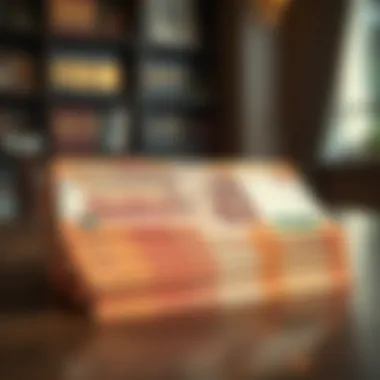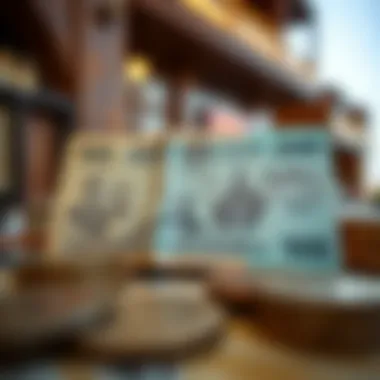Navigating the Currency Landscape in Dubai


Intro
Dubai, a city that shines like a diamond in the desert, boasts a unique currency system that plays a pivotal role in its economy. At its core, the United Arab Emirates Dirham (AED) is more than just paper and metal; it embodies the aspirations and transactions of both locals and expatriates. As Dubai continues to grow as a global hub for business and tourism, understanding its currency and the economic landscape surrounding it is essential for anyone looking to make their mark here.
The UAE Dirham has a storied history, tracing back to its origins, where it has seen various adaptations and adaptations influenced by the region’s rich trade heritage. Today, it stands as a symbol of the country’s growing status in the world economy. This article unfolds a detailed narrative exploring the legal framework, historical context, and the vibrant effect the Dirham has on key sectors for investors, particularly the real estate market.
Navigating the financial intricacies and currency considerations can indeed be daunting for expatriates and investors alike. However, being well-informed can empower individuals to harness the opportunities presented by Dubai's dynamic market.
This piece will delve into the market insights, laying out current trends in Dubai’s real estate, highlighting economic factors that influence property prices, and providing valuable investment strategies for those keen on entering this enticing marketplace.
Let’s embark on this journey to demystify the currency system in Dubai, understand the powerhouse that is the UAE Dirham, and equip you with the knowledge to navigate your financial ventures in this illustrious city.
Currency Overview
In the ever-evolving landscape of Dubai's economy, currency serves as more than just a medium of exchange; it's a fundamental pillar that supports commerce and investment. Understanding the currency dynamics in this vibrant city is essential for anyone looking to engage in business or make financial decisions. And while it may seem straightforward at first glance, currency encompasses a web of historical, legal, and economic influences that warrant a closer look.
Definition of Currency
Currency, in essence, refers to the official means of payment in a particular country, facilitating trade and commerce. In Dubai, this takes the form of the United Arab Emirates Dirham. It’s not merely about coins and banknotes; currency integrates various elements such as trust, stability, and economic policy. Different forms of currency exist, like physical cash and digital versions, which serve identical purposes but operate through various channels. This duality also allows digital payment solutions to gain traction in daily transactions.
Importance of Currency in Economy
The significance of currency in an economy cannot be overstated, especially in a global hub like Dubai. Currency acts as a barometer for economic health, with implications for inflation, interest rates, and investment strategies. For investors and homebuyers alike, understanding the fundamentals of currency can greatly impact decision-making.
- Influence on Trade: Currency values can determine pricing and competitiveness in international markets. A strong Dirham coupled with low inflation typically promotes economic stability, attracting foreign investment.
- Guide for Expatriates: For expatriates, the understanding of currency exchange rates is critical. A fluctuating Dirham can influence the cost of living and purchasing power in Dubai.
- Real Estate Investments: Currency fluctuations directly affect property values and can provide opportunities for savvy investors seeking to capitalize on lower rates.
"Currency is the lifeblood of economic activity. Without it functioning efficiently, the wheels of trade can seize up, leading to larger economic repercussions."
In summary, grasping the various facets of currency in Dubai, from its definition to its essential role in the economy, lays the groundwork for more complex discussions regarding the UAE Dirham, legal frameworks, and their direct impacts on both local and international investors.
The United Arab Emirates Dirham
The United Arab Emirates Dirham (AED) is not just a mere piece of currency; it represents the backbone of financial transactions in Dubai and the broader UAE. Essential for both day-to-day activities and large investments, the Dirham plays a crucial role in shaping the economic landscape of the region. It's important to understand its historical roots, current forms, and the policies that dictate its value before navigating the market.
History of the Dirham
The Dirham has an interesting history, evolving significantly since its inception. Originally derived from the ancient Greek currency known as the drachma, it has links to various cultures and periods. Established in 1973 as the official currency of the UAE, its value was pegged to the US dollar, creating stability in the market. This historical context is crucial, as it exemplifies how the Dirham was designed to promote trade and investment, facilitating not only local but international commerce.
Understanding this history is pivotal, especially for investors and expatriates who are trying to gauge the economic climate of Dubai. The Dirham's consistent value over time reflects the UAE's commitment to a stable and prosperous economy.
Physical and Digital Forms
In today's world, the Dirham comes in both physical and digital forms. The physical currency includes banknotes and coins, which are widely used across the UAE. Banknotes are issued in denominations of 5, 10, 20, 50, 100, 200, 500, and 1,000 Dirhams, while coins are available in 1, 5, 10, 25, 50 fils, and 1 Dirham. Each note features significant landmarks and cultural icons, making them not just currency but a representation of Emirati pride.
On the digital front, the popularity of mobile wallets and online banking in Dubai is on the rise. Innovations in fintech have made it easier for residents and tourists alike to make transactions without the hassle of handling cash. Apps such as "Dubai Pay" and various banking solutions allow exchanges to happen in the blink of an eye, standing as a testament to the region's embrace of technology.


Fixed Exchange Rate Policy
Overview of the Fixed Exchange Rate
A hallmark of the UAE's monetary strategy is its fixed exchange rate policy, pegging the Dirham to the US dollar at a stable rate of approximately 3.67 AED to 1 USD. This policy fosters confidence among traders and investors, creating a reliable economic environment. It also reduces the likelihood of currency fluctuations that could destabilize purchasing power. Investors, particularly those looking into real estate, find this stability appealing, as their financial projections become easier to manage under predictable conditions.
A fixed exchange rate can be seen as a 'safety net' for those entering the market. Since the Dirham maintains its value against major currencies, risks associated with exchange rates are minimized, making it a solid option for both short-term and long-term investments in the UAE.
Implications for Investors
For investors, the implications of a fixed exchange rate are profound. The certainty it provides allows for strategic planning and budgeting in transactions. When an investor knows the exchange rate remains consistent, they can better predict costs related to property acquisition, rent, and operating expenses.
However, a potential disadvantage exists in a fixed regime; it can limit monetary policy flexibility. If the local economy faces some turbulence, the central bank may find it challenging to make necessary adjustments. Yet for most stakeholders, this stability often far outweighs the challenges, ensuring the Dirham remains a desirable currency choice.
The Dirham serves a multitude of roles in shaping Dubai's economy. With a rich history, versatile forms, and a strong fixated monetary policy, it embodies a financial sanctuary for various stakeholders ranging from expatriates seeking residence to investors eyeing lucrative opportunities.
Legal Framework and Regulation
The legal framework and regulatory oversight in Dubai provide the backbone for its currency system, ensuring stability and trust among investors, expatriates, and locals alike. This landscape governs how the United Arab Emirates Dirham operates, safeguarding transactions and establishing laws that underpin economic activities. Understanding this context is crucial for anyone engaging in Dubai’s vibrant financial ecosystem.
Regulatory Authorities
In Dubai, the primary regulatory body that oversees the currency and financial activities is the Central Bank of the UAE. Established in 1980, this institution is tasked with maintaining monetary stability and ensuring the health of the financial system. The Central Bank sets policies that control inflation and manage exchange rates, which directly impacts both local and foreign investors.
The Central Bank works hand in hand with several other regulatory authorities, including the Dubai Financial Services Authority (DFSA), which governs financial services conducted in the Dubai International Financial Centre. The DFSA's role is to support the growth of Dubai's financial services sector while maintaining high standards of regulation.
With stringent guidelines in place, the sector has earned a reputation for transparency and accountability, vital for attracting foreign investment. Policies are continually evaluated and updated to align with global best practices, reflecting a commitment to fostering a robust economic environment.
Currency Laws and Policies
Currency laws and policies play a defining role in shaping the financial landscape within Dubai. The Dirham, pegged to the US dollar at a rate of approximately 3.67 AED to 1 USD, provides a sense of predictability and stability for both domestic and international commerce. This fixed exchange rate system minimizes risks associated with currency fluctuations, making it easier for investors to plan their financial strategies.
Additionally, the laws surrounding currency exchange are designed to deter illegal activities such as money laundering and fraud. Cross-border transactions are subject to stringent controls, and businesses operating in Dubai are mandated to comply with these regulations to maintain the integrity of the financial system.
Here’s an outline of some key components of currency laws and policies in Dubai:
- Exchange Rate Policy: The fixed peg to the US dollar, fostering stability in business operations.
- Anti-Money Laundering Measures: Strong regulations designed to combat illicit financial activities.
- Consumer Protection Laws: Protecting the rights of individuals and businesses in currency transactions, encouraging fair practices.
Navigating the intricate web of currency regulations in Dubai demands a clear understanding of these laws. Failure to comply can result in hefty penalties and damage to reputation, particularly for investors and expatriates seeking to establish a presence in this dynamic market. The regulatory environment must be viewed not just as a set of rules, but as a structure that supports economic growth and safeguards the financial interests of all stakeholders involved.
Impact on Real Estate Market
The relationship between currency and the real estate market in Dubai is pivotal. A currency, particularly the United Arab Emirates Dirham, plays a crucial role in determining property valuations and investor confidence. With Dubai being a melting pot for expatriates and a hub for global investors, the flow of currency significantly affects how properties are valued and traded. Understanding this dynamic is essential for anyone looking to buy or invest in real estate in the region.
Currency and Property Valuation


Property valuation in Dubai often hinges on the strength or weakness of the Dirham. When the Dirham holds steady against other major currencies, it creates a stable environment for both buyers and sellers. This stability can promote higher property prices, as investors feel more secure about their financial commitments. Conversely, if the Dirham were to weaken, it might make properties cheaper for foreign buyers, which could drive up demand but potentially decrease the value of the property for local investors.
Additionally, what one must keep in mind is the concept of purchasing power. For expatriates earning in currencies like the Euro or USD, a stronger Dirham means they can buy less in terms of property than before. A direct correlation exists here: as the Dirham fluctuates, so do property prices, which can lead to an immediate reevaluation of an individual's investment strategies.
Repercussions of Currency Fluctuations
Effects on Foreign Buyers
Foreign buyers are particularly sensitive to currency fluctuations. When the Dirham is strong, investors from abroad may find themselves facing higher costs when purchasing property. This scenario could discourage them from investing in Dubai, as the perceived value diminishes when comparing it to their home currency. In contrast, if the Dirham weakens, opportunities arise; foreign investors could jump at the chance to acquire property at a lower cost, hence stimulating the market.
A unique aspect of this situation is its cyclical nature: a rise in foreign investment can drive up demand, leading to an increase in property values, which pushes the Dirham back up. This can be particularly beneficial for local homeowners looking to sell, as they could profit off an increase in market value.
Market Trends
The trends we observe in the real estate market are closely tied to currency fluctuations. Economic predictions suggest that if oil prices remain stable and geopolitical tensions ease, the Dirham could maintain its strength. Such strength translates into greater investment potential, fostering an environment where property prices rise steadily.
Moreover, understanding market trends is crucial. Demand often spikes when prices drop, drawing more foreign buyers into the fray. However, if values get too high due to inflating currency strength, we'd likely see a pullback from potential investors. Thus, constantly monitoring the relationship between currency and real estate trends is paramount for anyone seeking to navigate this complex market effectively.
"Investors should keep a keen eye on currency movements as they can greatly affect purchasing power and ultimately dictate the success of real estate investments in Dubai."
Analyzing these effects within the context of both localized and foreign perspectives will offer a rich understanding of the current market dynamics, helping prospective buyers and investors make informed decisions. With this knowledge in hand, one can navigate the intricacies of Dubai's real estate landscape more adeptly.
Practical Insights for Expatriates
Navigating the currency landscape in Dubai can be quite the task, especially for expatriates who may not be familiar with the local norms. Understanding the practical aspects of currency exchange, alongside the risks involved, is essential for anyone looking to make the most of their financial transactions in this vibrant city. This section aims to arm you with the knowledge needed to make informed decisions, reducing any potential hassle along the way.
Currency Exchange Practices
When moving to a new country, getting a grip on currency exchange practices is like having the key to a chest full of treasures. In Dubai, exchanging currency is relatively straightforward, thanks to the proliferation of exchange houses and banks. Expats often find themselves curiously scanning the busy streets of Deira, where these exchanges are aplenty, but the trick is knowing where to go.
In Dubai, you might want to consider the following:
- Competitiveness: Exchange rates can differ widely from one provider to another. It's common to see exchange houses in malls offering better rates compared to those in less trafficked areas. Checking a few spots can save you a fair chunk of change.
- Fees & Commission: Be wary of hidden fees. While some places might advertise no commission, their rates may reflect a higher implied cost. Always ask for the total amount you will receive when you exchange your currency.
- Timing: Exchange rates can fluctuate throughout the day, influenced by various global factors like oil prices. Keeping an eye on trends might help you choose the right moment to exchange your money.
In a rapidly changing market, knowing where and when to exchange can make a substantial difference. Making your money work smarter is the name of the game.
Tips for Managing Currency Risks
Managing currency risk is another important aspect that expatriates should take into account. Fluctuations in exchange rates can affect your financial situation, especially if you are dealing with substantial sums for property investments, business transactions, or running day-to-day expenses. Here are some strategies to keep you in safe waters:
- Diverse Accounts: Having a mix of currencies in your bank accounts can buffer against volatility. If you earn or spend in different currencies, it may be beneficial to hold accounts in those currencies.
- Hedging Options: Explore hedging options such as forward contracts through your bank, which allow you to lock in exchange rates for future transactions. It’s like having an umbrella on a rainy day.
- Monitoring Tools: Utilize financial apps or websites that give live updates on currency rates. Setting alerts for specific exchange rates can help you make timely decisions.
- Expert Guidance: Consulting with financial professionals who understand the intricacies of currency markets might provide you with insights that you wouldn't have otherwise. They can tailor strategies specific to your needs and profile.
“In the world of currency, knowledge is as valuable as gold. Equip yourself.”
By taking these measures, expatriates not only protect themselves but also position themselves strategically to capitalize on currency fluctuations. It's about navigating the waves of uncertainty while steering your financial course with confidence. Understandably, managing currency isn't just a task; it is an ongoing process that deserves attention and awareness, ensuring expats can settle comfortably in one of the world’s most dynamic cities.


For more insight on currency practices in the UAE, you may explore resources such as UAE Exchange and The National.
Influence of Global Economic Factors
In a world that’s becoming increasingly connected, the impact of global economics on local currencies cannot be understated. This section will delve into two significant elements affecting the UAE Dirham and its functionality in Dubai: oil prices and geopolitical considerations. Recognizing these factors is crucial for investors, realtors, expatriates, and anyone engaged in the city’s bustling economy.
Impact of Oil Prices
Oil is often dubbed the lifeblood of the Gulf economies. For the UAE, and particularly Dubai, fluctuations in oil prices can have direct and sweeping implications on currency stability and financial health. When oil prices soar, it tends to spill over into greater economic strength. This usually results in increased foreign investments and a robust local market.
Conversely, a dip in oil prices can shake things up considerably. The UAE economy, while diversified, still has a strong reliance on oil exports. If prices plunge, the domino effect can lead to reduced government spending, affecting public projects and, in turn, the real estate market. Investors need to keep a keen eye on trends in oil prices as they can signal broader economic shifts:
- Increased Investment: Higher oil prices typically bring in more foreign direct investment, which often leads to a stronger Dirham.
- Economic Growth vs. Contraction: Sustained high prices can result in an economic boom, lifting housing and commercial property values. On the flip side, plummeting prices could usher in market stagnation.
Moreover, oil prices often affect international trade. When the price of oil is favorable, UAE exporters gain, which can bolster the Dirham's value. If you're involved in real estate or banking, understanding these dynamics is vital. Analyzing oil market trends can offer foresight into future currency movements and purchasing power.
Geopolitical Considerations
Geopolitics, too, plays a sizable role in currency dynamics. Dubai sits at a significant crossroads of East and West, and its economic positioning makes it susceptible to international relations and market sentiments. Situations like military conflicts or diplomatic crises can inject uncertainty into the Dubai economy, influencing investor behavior and weakening the Dirham.
Key geopolitical aspects that influence the currency include:
- Regional Stability: A stable Middle East is a boon for investments. Tensions can provoke a flight to safety, causing investors to pull funds from riskier markets.
- Trade Agreements: Policies and trade relationships with countries can shape currency strength. Favorable agreements can lead to boom times, while sanctions or trade wars might choke off vital trade flows.
- Foreign Perception: Global sentiment about the UAE can shift based on geopolitical events, affecting tourism and expatriate investments. A positive perception tends to reinforce the currency.
Understanding the influence of global economic factors on the UAE Dirham is key for navigating investments successfully.
Future Trends in Currency and Economy
Examining the future trends in Dubai's currency and economy is key for understanding how the landscape may evolve. With the rapid pace of change in global finance and the unique position of Dubai as a pivotal economic hub, analyzing these elements can illuminate opportunities and challenges ahead.
Predictions for the Dirham
Several factors will shape the future of the UAE Dirham. Notably, stability and predictability are crucial, particularly given Dubai's reliance on trade and tourism. As the global economic situation shifts, demands for currency stability increase.
- One ongoing trend is the potential for digital currency adoption. The Central Bank of the UAE has shown interest in exploring digital currencies as a way to enhance transaction efficiency.
- Experts suggest that maintaining the Dirham's peg to the US dollar might continue for the foreseeable future, offering a certain level of security for investors.
The Dirham�’s future might not just involve its exchange value but also its adaptability to new technologies. However, gauging public sentiment and adaptation to digital currencies will be essential. In addition, international economic relations and pressures will shape how the Dirham competes with other currencies.
Emerging Economic Dynamics
As the economy evolves, several dynamics are emerging that have significant implications for currency stability. These include:
- Diversification of the Economy: The UAE is committed to reducing its dependence on oil revenue, fostering sectors like technology and tourism. A diversified economy can enhance currency strength by improving overall economic resilience.
- Foreign Investment Trends: The increase in foreign direct investment (FDI) flows, especially in real estate, adds complexity to currency dynamics. Investors are seemingly attracted not just for returns but also for the strategic geographical location of Dubai.
- Sustainability Initiatives: A growing focus on sustainable development could impact the currency and economy in the long run. The alignment with global sustainability goals may attract international investors, positively affecting the Dirham.
- Global Economic Influences: Changes stemming from geopolitical shifts, trade agreements, or economic policies from major economies will affect currency exchange and investment strategies within the UAE.
Given these factors, investors, expatriates, and homebuyers need to stay attuned to signposts indicating the currency's direction. The market can shift in a heartbeat, and understanding these emerging dynamics can serve as a safety net for those looking to make informed financial decisions in Dubai.
“In every crisis, there is an opportunity.” - John F. Kennedy
Recognizing and adapting to future trends and economic dynamics surrounding the Dirham can not only provide insights for existing players in the Dubai market but also attract new investors looking to stake their claim in this vibrant environment.
For more in-depth insights into economic trends, resources like Wikipedeia or Britannica might be useful.















